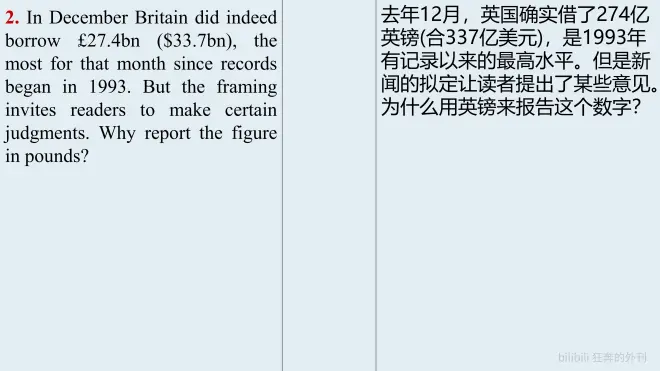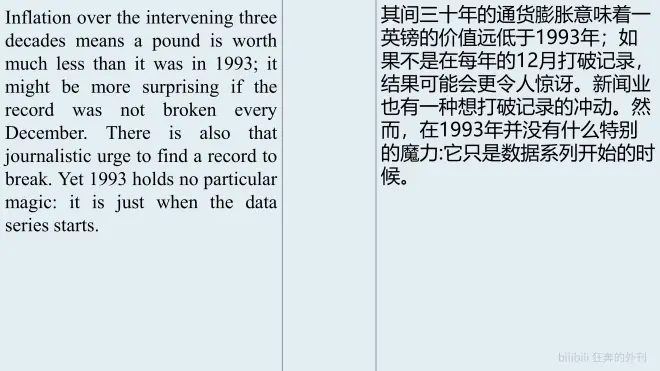外刊听读| 经济学人 不公正的BBC报道

Economics
经济学
Boxed in
阻碍
The BBC's coverage of economics is not biased, but it is not impartial either
英国广播公司对经济的报道没有偏见,但也不公正
“DEBT COSTS help push government borrowing to 30-year high,” the website of the British Broadcasting Corporation (BBC) told users on January 24th. That headline exemplifies what an independent report by Michael Blastland, a former BBC radio producer, and Sir Andrew Dilnot, an economist, labels a breach of the Beeb’s commitment to impartiality, not through deliberate bias but “uninformed groupthink and lack of confidence to challenge arguments”.
英国广播公司(BBC)网站1月24日告诉用户,“债务成本将把政府借款推高至30年来的最高水平”。该标题违反了前BBC电台制作人迈克尔·布拉斯兰德(Michael Blastland)和经济学家安德鲁·迪尔洛特爵士(Sir Andrew Dilnot)在一份独立报告中对BBC公正性的承诺,这种违反不是因为有意的偏见,而是由于无知的群体思维和缺乏挑战观点的自信心所导致的。”。
In December Britain did indeed borrow £27.4bn ($33.7bn), the most for that month since records began in 1993. But the framing invites readers to make certain judgments. Why report the figure in pounds? Inflation over the intervening three decades means a pound is worth much less than it was in 1993; it might be more surprising if the record was not broken every December. There is also that journalistic urge to find a record to break. Yet 1993 holds no particular magic: it is just when the data series starts.
去年12月,英国确实借了274亿英镑(合337亿美元),是1993年有记录以来的最高水平。但是新闻的拟定让读者提出了某些意见。为什么用英镑来报告这个数字?其间三十年的通货膨胀意味着一英镑的价值远低于1993年;如果不是在每年的12月打破记录,结果可能会更令人惊讶。新闻业也有一种想打破记录的冲动。然而,在1993年并没有什么特别的魔力:它只是数据系列开始的时候。
Such choices are part of what the report says is a reflex assumption in the BBC’s coverage that debt is always and everywhere bad, rather than a tool that states can use well or badly. Whether this perspective harms the Labour Party, which has historically favoured higher spending, or the Tories, on whose watch debt has steadily risen, is uncertain. It definitely flattens debate.
报告称,这种选择表明了BBC的部分想法,即债务在任何时候、任何地方都是坏的,而不是国家可以用好或者搞砸的工具。这种观点可能伤害了历来支持增加政府支出的工党,或是伤害了支持政府债务稳步上升的保守党。但这无疑使有关辩论变得平淡无奇。
The underlying problem, reckon the report’s authors, is that the BBC takes too much of a lead from Westminster. It uses the judgments of political reporters to decide which economic stories are important and then frames them as a two-sided contest between the left and the right. That lets the politicians determine what counts as a reasonable opinion. Both the government’s and the opposition’s embrace of austerity in 2010 meant that Keynesian economics, which might have advocated fiscal stimulus, did not get a fair shake. In that case, the consensus between the main political parties led to the false impression of consensus among economists.
该报告的作者认为,根本问题在于BBC从英国政府那里获得了太多的领先。BBC利用政治记者的判断来决定哪些经济报道是重要的,然后将它们框定为左翼和右翼之间的双边较量。这让政治家们决定什么是合理的意见。政府和反对派在2010年都支持紧缩政策,这意味着凯恩斯主义经济学没有得到公平的对待,尽管它可能提倡财政刺激。在那种情况下,一种错误印象形成,即主要政党之间的共识导致了经济学家之间共识。
Many economists had similar beefs about the BBC’s coverage of Brexit, accusing it of trying to balance the overwhelming consensus in the profession against a few fringe figures who suggested that leaving the EU would help boost growth. In that case, political rifts obscured agreement among economists. That may not be systematic bias but it nonetheless matters—76% of Britons get their news from the BBC, far more than will ever read an economics paper.
许多经济学家对BBC对英国退出欧盟的报道有类似的不满,指责它试图平等对待业内压倒性的共识和少数边缘人物的观点,后者认为离开欧盟将有助于促进增长。在这种情况下,政治分歧掩盖了经济学家之间的共识。BBC的做法可能不是系统性的偏见,但它仍然很重要——76%的英国人从BBC获得新闻,远远超过阅读经济文献的人数。









